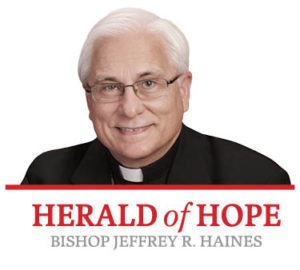BISHOP JEFFREY R. HAINES
HERALD OF HOPE
On the evening of Sunday, Sept. 29, I traveled to Beth Israel Sinai Congregation in Racine to represent  Archbishop Jerome E. Listecki and the people of the Archdiocese of Milwaukee in expressing support to a community that had suffered an anti-Semitic hate crime. Just a week earlier, the synagogue had been desecrated by vandals who spray painted Nazi symbols upon the building, such as a swastika and the rune “S” symbol associated with the German Secret Service, or Schutzstaffel. I was expecting to find a congregation shaken and still reeling from yet another act of hatred in the long line of cruelty toward the Jewish people. What I found, however, was a congregation that had risen above the depravity through their faith and bravery, bolstered by the encouragement of ecumenical friends and neighbors.
Archbishop Jerome E. Listecki and the people of the Archdiocese of Milwaukee in expressing support to a community that had suffered an anti-Semitic hate crime. Just a week earlier, the synagogue had been desecrated by vandals who spray painted Nazi symbols upon the building, such as a swastika and the rune “S” symbol associated with the German Secret Service, or Schutzstaffel. I was expecting to find a congregation shaken and still reeling from yet another act of hatred in the long line of cruelty toward the Jewish people. What I found, however, was a congregation that had risen above the depravity through their faith and bravery, bolstered by the encouragement of ecumenical friends and neighbors.
The Racine Interfaith Coalition had been promoting attendance at a special prayer service meant to express solidarity with the assembly of Beth Israel Sinai Congregation. When I arrived at the site, I was stunned by the turnout. The congregation is small, with only 25 to 30 registered members, but the number present for the service was close to three times this size. It was a gathering rich in diversity, representing a variety of races, cultures and religion.
The leader of prayer was Rabbi Martyn Adelberg, who has served the congregation for almost 20 years. He began the service with remarks lamenting the growing trend in acts of violence against Jewish Houses of Worship. Recent statistics indicate that there has been a 54 percent increase in such acts in the United States within the past three years. Yet, he expressed heart-felt words of gratitude for the expression of goodwill manifested in the gathering. He hailed such support as the very antidote to the sickness that was embodied in the hateful defacing of the synagogue. Noting that the evening was the commencement of Rosh Hashanah, the Jewish New Year, he pointed out that the celebration often was looked upon as an act of “New Creation” by the Lord. In addition, he praised the affirmation of those present as a manifestation of a new birth of love.
The president of Beth Israel Sinai Congregation, Joyce Placzkowski, also spoke in appreciation for the number of people who reached out to the Jewish community. She commented, “If this person’s (who performed the vandalism) plan was to spread hate and fear, he missed. Instead, he angered others with his actions. We found out how strong our neighbors and friends are.”
A former mayor of the city of Racine, John Dickert, also spoke during the service. He, too, offered recognition of the power of benevolence to overcome the effort to spread bigotry and intolerance. “Whoever this is, who did this, whatever hatred permeates your heart, you obviously don’t know these people or this Rabbi. We’ll defeat you and we’ll defeat you with knowledge and love and conversation.”
I was privileged to speak with Rabbi Adelberg and to convey the promise of prayers and support on behalf of the archbishop and the Catholics of southeastern Wisconsin. I articulated my sadness and dismay that acts like the vandalization of the synagogue continue to perpetuate the tragic history of prejudice and hostility toward the Jewish people.
As I departed from Beth Israel Sinai Congregation, I continued to reflect upon the need to find a way to overcome the sinful persistence of anti-Semitism. My thoughts returned to the courageous and compelling messages that I heard from the speakers at the prayer service. I concluded that there is a need to prevent the voice of intolerance from becoming the message that is predominant in society. The voice of love and harmony must rise in volume and drown out hatred. That sound of unity was what I heard that night. That sound was made possible primarily by a determined ecumenical effort from people of diverse faiths to coming together. So, if we wish to defeat anti-Semitism and the scourge of all prejudices in our time, we truly must strive harder to collaborate with the diversity of religions in order to speak in one voice, and thus more clearly and loudly articulate a message of peace and love.
